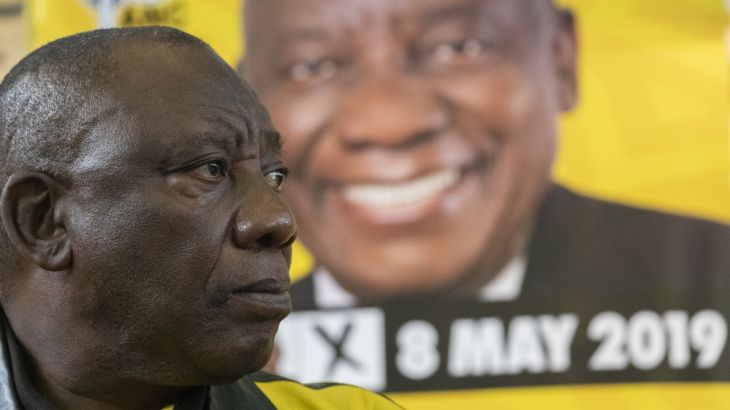
Cyril Ramaphosa’s South Africa election win and the economy
Can the poor boy who became a business magnate lead South Africa out of its economic mess?
South Africa‘s Cyril Ramaphosa was re-elected this week despite the failure of his ruling African National Congress (ANC) party to get a grip on the economy and corruption. The former union leader turned business magnate has promised to create jobs and continue to fight corruption. He needed a resounding victory to unite a party that has been deeply divided since the ousting of scandal-plagued Jacob Zuma a year ago.
Unemployment is at a 15-year high of 27.1 percent and youth unemployment is at the highest level globally at 54.7 percent. Ramaphosa has pledged to create 275,000 jobs a year but that can only happen if the economy is expanding at a rate of about 5 percent.
Keep reading
list of 4 itemsShip that caused deadly Baltimore Key bridge collapse towed to port
‘Why should we vote?’ India’s jute workers blame politicians for woes
California farmworkers cheer new housing in town scarred by mass shooting
The economy grew just 0.8 percent in 2018 after recovering from a recession, the country’s second in a decade. And it has not grown more than 2 percent over the last five years.
All this is against a backdrop of inequality, electricity and water shortages.
What South Africa needs is private sector confidence to be reinvigorated for investors to start investing again in order to boost growth.
On the challenges facing the country, Razia Khan, chief economist for Africa and the Middle East at Standard Chartered, says: “The South African economy has really struggled to achieve lasting momentum and if any of the high-frequency data releases from the first quarter of this year are anything to go by, there’s even the risk of another economic contraction quarter-in-quarter at the beginning of this year.”
“The question is though, does this election result change anything? Will we now see the institutionalisation of reforms, will we see a surge in consumer and business confidence, could we see household spending and investments taking off?”
Khan says the South African economy needs to be growing a lot faster. “There have been a number of measures put in place to try to reduce the overall impact of inequality, not least the provision of social grants and [an] extensive social grant system, but ultimately the best way to reduce poverty would be to achieve an accelerated growth rate over time. It’s this issue that South Africa policy must focus on.”
“What South Africa needs is private sector confidence to be reinvigorated for investors to start investing again in order to boost growth,” says Khan.
India election
As well as having some of the poorest people in the world, India also boasts some of the wealthiest. India is home to the third-highest number of billionaires in the world, including Asia’s richest person. But as its economy expands, many people are asking if it is only the wealthy who are benefitting.
Ruchir Sharma, the New York Times bestselling author of Breakout Nations and The Rise and Fall of Nations, took a break from India’s election campaign, having made 28 stops across Uttar Pradesh, to talk to Al Jazeera about his latest book.
|
|
In Democracy on the Road: A 25-year journey through India, Sharma has unparalleled access to leaders of the main parties, Narendra Modi and Rahul Gandhi. But, he goes further in talking to farmers, shopkeepers and chief executives. And that is what makes his insights more important.
“This is a very comparative election, it’s very hard to call as to which way this election is going to swing,” says Sharma. “That’s the problem with calling elections in India. The polity here is so fragmented, the country is so diverse that all it takes is a one percent swing for the BJP or against the BJP for the election result to look very different. That’s why it’s so difficult to call one of the most competitive elections that I’ve seen in India’s recent history.”
On whether Modi is the right man for the job, Sharma says: “It’s very difficult to govern this country at a central level. The way Modi governed when he was the chief minister of Gujarat – a state leader, compared to now when he’s been able to govern at the centre tells you about the challenges of governing a country as diverse as India.”
“When he was chief minister of Gujarat, he oversaw one of the fastest growth rates any state in India has ever experienced, with a growth rate of nearly 12 percent during his first term every year. But in Delhi it’s much more difficult, because the states don’t like to listen to the centre. The states sort of do their own thing, and his model of trying to govern India in a very centralised way, the way he governed Gujarat, obviously hasn’t worked … giving more power to the states in India is the way to go.”
Also on this episode of Counting the Cost:
Nigeria farmers: Nigeria is Africa’s largest oil producer but more than half of its population lives in extreme poverty. In his recent election campaign, President Muhammadu Buhari promised to diversify the economy away from oil. But Nigeria is even struggling to grow its own food, as Haru Mutasa reports from Ogun State.
Pakistan’s Lake Manchar: Manchar is Pakistan’s largest freshwater lake. It covers more than 250 square kilometres during the peak monsoon season. But it has become a dumping ground for industrial waste, and that is putting the lives of people who depend on the lake at risk, as Kamal Hyder reports.
Norway codfish: Across the world fish stocks are under threat from over-fishing and a changing climate. Now rising ocean temperatures could threaten one of the most intact and important fisheries on the globe. Nick Clark reports from the Lofoten Islands in Arctic Norway.